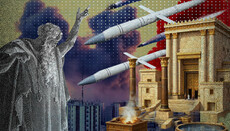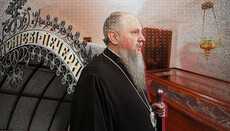Nationalism – religion, and Bandera – its prophet?!
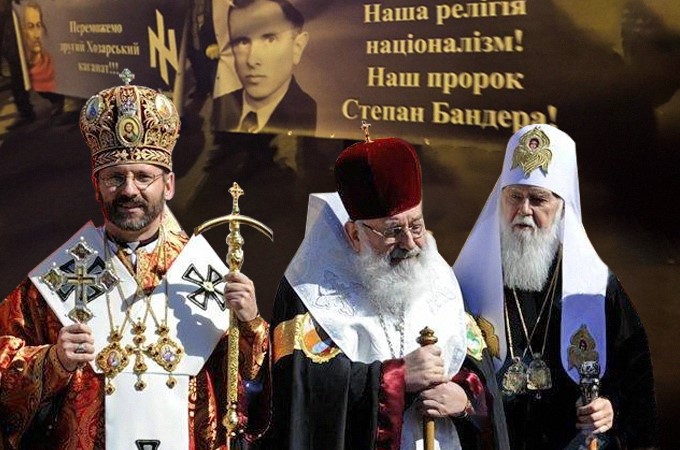
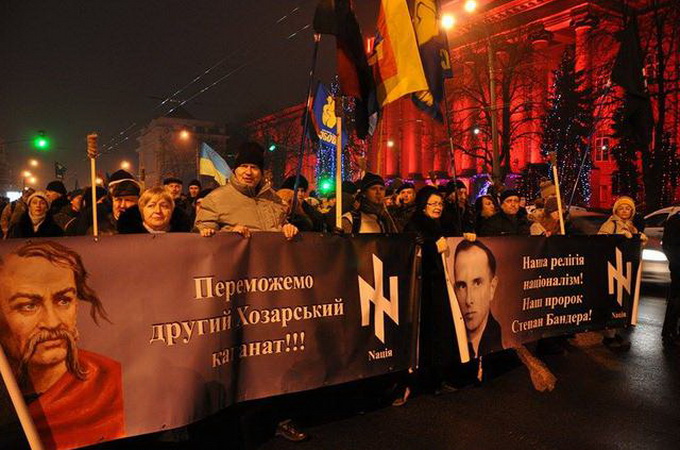
Flare processions, gut-wrenching chants, the cult of personality look pretty much similar to pagan ritualism. If we ponder on it, we may arrive at the conclusion that paganism is a logical end of the nationalism evolution as it is, and vice versa, nationalism is the highest form of paganism development. In this context an impact of nationalism on the Church appears extremely dangerous. In Ukraine this is just the case. Nationalist movements are supported both by the Kiev Patriarchate and the Ukrainian Greek-Catholic Church.
As early as in the 90s the representatives of the Kiev Patriarchate turned up on a regular basis at the party assemblies organized by “Rukh” and other parties, which positioned themselves as national-democratic or nationalist. At present, the Kiev Patriarchate favors “All-Ukrainian Association “Freedom” and “Right Sector”. In September 2015 KP chief Philaret stood up for “Freedom” member Yuriy Sirotiuk, being suspected of organizing civilian riots near the Verkhovna Rada on August 31, which led to the death of several National Guard fighters. Speeches of the KP spokesmen more and more contain glorifications of the OUN-UPA members who were even called “saints” by UOC-KP “bishop” Mikhail Zinkevich.
Such an obvious support is certainly not “for free”. Both “Freedom” and “Right Sector” are supportive of the Kiev Patriarchate, in their turn. This support is manifested through intensive actions targeted against the Ukrainian Orthodox Church, led by Metropolitan Onuphry. “Right Sector” delivers its fighters to the UOC KP in raids of the UOC temples, intimidation, and physical violence with regard to parishioners of the canonical Church.
As for the UGCC, it is already a “proverb and byword” to hear public speeches of Uniate priest Mikhail Arsenich near the monument to Bandera in 2010, urging to fight with “kikes”, “Moscals”, “Communists”, and “take arms”. Unfortunately, the “sermon” made by the chaplain, which was an outspoken incitement of inter-faith hostility, was not duly assessed by the law enforcement bodies and church authorities. The priest “got a slap on the wrist” from the church administration and a monthly “repentance” in the monastery.
In November ex-leader of the UGCC Lubomir Guzar who has a considerable influence on the parish, declared that “it is good to be a nationalist. A lot of nations across the globe, regardless the level of their culture, are proud of their nationalism.” He stated, though, several months before something very different, namely that “nationalism cannot be a Christian virtue, because it is not perfect, and makes a human somewhat provincial, since a nationalist loves only his.”
Bifurcate self-consciousness is common for Greek-Catholics. On the one hand, the Catholic Church warns against manifestations of nationalism, on the other hand – a significant part of the UGCC history is marked by the collaboration with nationalist movements. At the beginning of the Second World War bishops of the Greek-Catholic Church blessed the activity of the Ukrainian Nationalists Organization, having lots of evidence thereto.
It is no surprise we will not hear Uniates or Kiev Patriarchate criticize or condemn contemporary Ukrainian nationalists. It would be equal for the former to “biting the hand that feeds you.” However, such “symbiosis” of nationalism and religion in “patriotic” Churches will result in Christianity being replaced by paganism in a Christian wrap. Nationalism strives to the total power over beliefs and convictions of a man, therefore it’s impossible to control or restrain it.
The leadership of UGCC and KP think it is they, who use nationalist movements, yet it is just the other way about – it is nationalists who use these Churches in their interests. The further it goes, the more Uniates and schismatics get stuck in the political morass and political discourse, turning into an ideological colony for nationalistic parties.
In KP-owned churches one can often see a bizarre combination of state and religious symbols. For instance, a trident above the Holy Doors or entrance to the church, an abundance of blue-and-yellow stripes, ethnic ornaments, flags, etc. During cross processions, organized by the Kiev Patriarchate, one can hear more folk singing than praying.
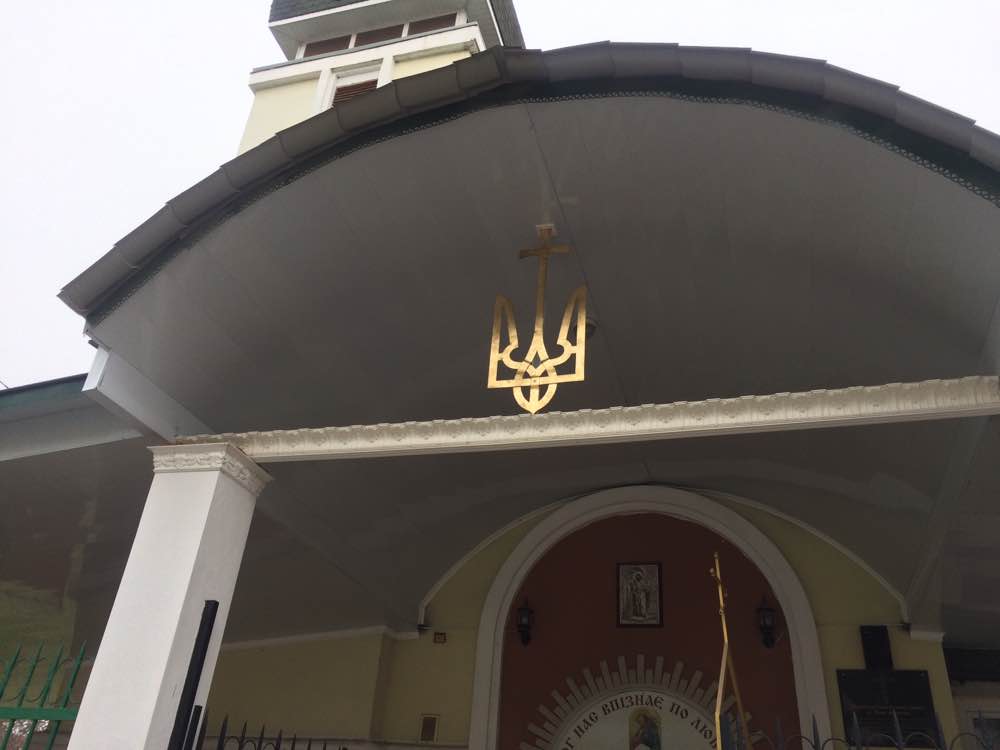
Nonetheless, even a pagan perversion not always brings satisfaction to nationalists and they resort to purely pagan symbols. Notorious regiment “Azov” set up a wooden statute of pagan deity Perun at their military base. Poignantly pagan and somber looked a ceremony, held by “Azov” members, when they commemorated their dead war buddies.
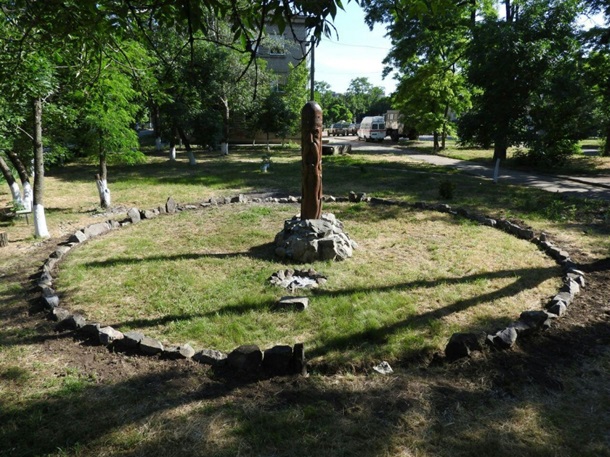
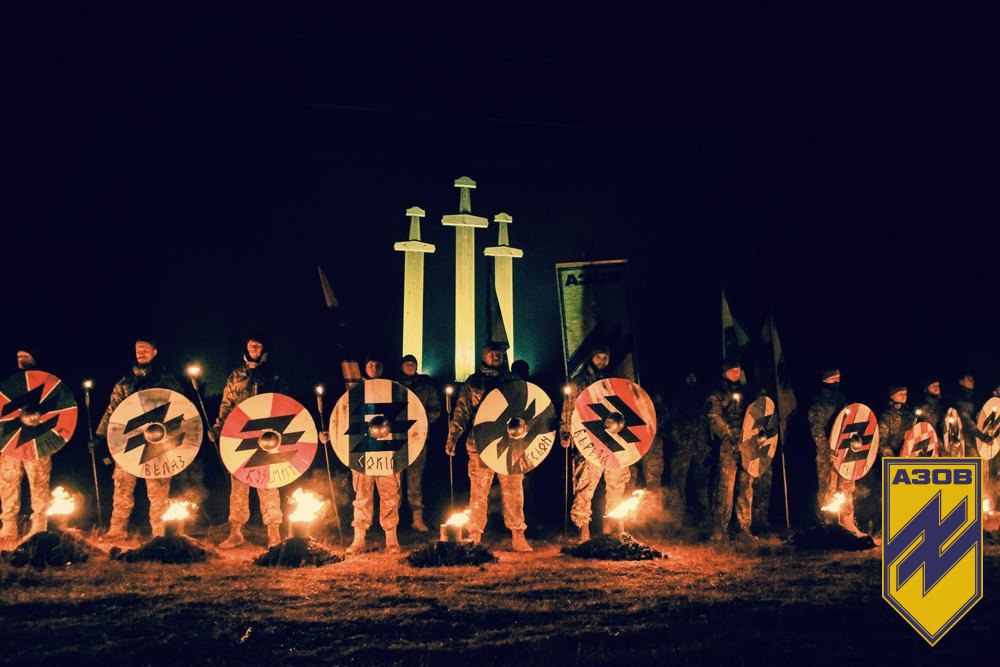
It is not the Church that should seek help from the state and politics, but the state should be guided with fundamental Christian principles, not compelling the Church to sanctify any action it takes. In a democratic state the Church has to serve with a voice of conscience and as a key critic of the society. Let’s emphasize it – not only the state, but the society in general. One can pour criticism on the state, at the same time cozying up to mean and barbaric folk elements. The Church must have courage to communicate unbiased things to the public. To blame corruption is fine, but will the UGCC and KP leaders have a nerve to stand up against nationalist slants in the Ukrainian society?
Why did neither Philaret not Sviatoslav Shevchuk condemn the rhetoric of Bogdan Butkevich, who expounded on how many Donbass citizens had to be killed; nor did they criticize statements made by Dmitriy Korchinsky about concentration camps for Donbass residents and “American” practices on destruction of occupied territories; or words said by Dmitry Gordon, who called Donbass people “zombified degenerates”? Don’t they all realize that radicalization of the society is akin to nuclear reaction – once launched, it will result in violence explosion?
Archbishop Sviatoslav tells smart things about the need to help citizens of the East of Ukraine, at the same time being totally silent on the above mentioned insults, addressed to Donbass people from Ukrainian journalists and political actors. Representatives of the Kiev Patriarchate behave in a similar way: in western Ukraine they declare “they will bury those who are attracted to the North (Russia)” and call the Russian language “the language of invades”; however, when arriving in Donbass, they make a U-turn in their rhetoric, saying it does not matter what language a person speaks in.
The country, in which the nationalist actor of the last century is announced “prophet”, is doomed to falling into the same pattern of historic mistakes. Where there is no place for true prophets and true religion, there is always a place for pseudo-religion and false prophets.
0
0
If you notice an error, select the required text and press Ctrl+Enter or Submit an error to report it to the editors.
Read also

Religious “advocacy” of the authorities is inherited from Soviet times
26 February 15:58

What does the government want from Metropolitan Arseniy?
22 February 00:31

A word as a crime: What the court found Metropolitan Theodosiy guilty of
16 February 14:24






